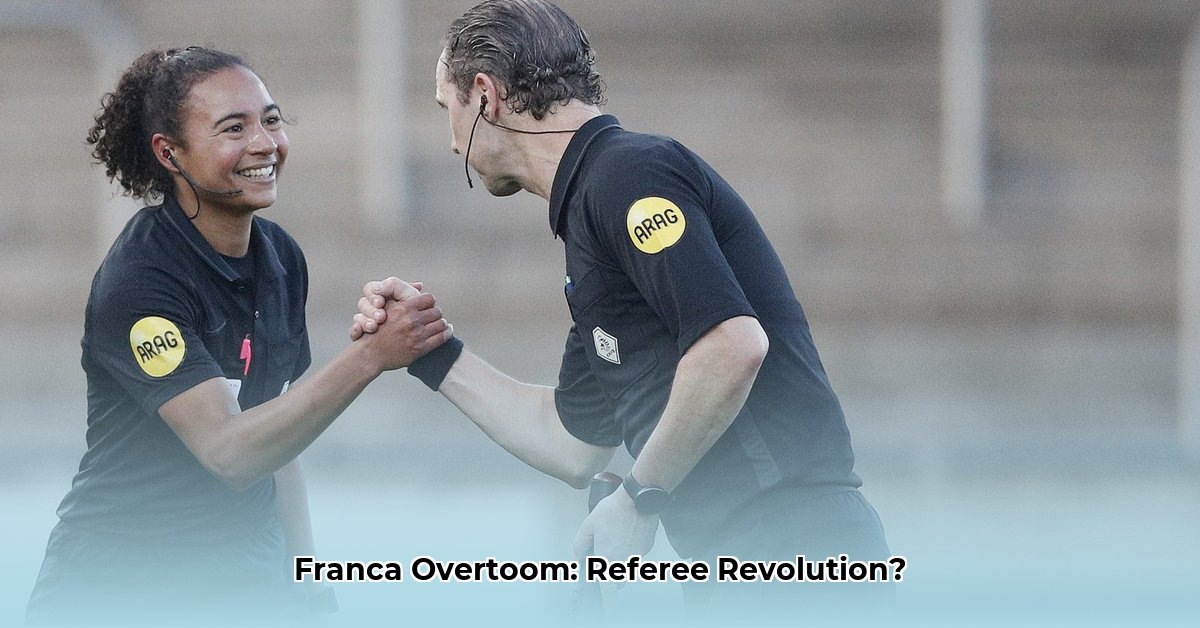
Franca Overtoom Relatie's name echoes through Dutch football history. She's not just a referee; she's a trailblazer, the first woman ever to officiate an Eredivisie match. This achievement resonates far beyond the pitch, a powerful symbol of progress for women in sport and a testament to challenging the status quo. Her journey is a compelling narrative of grit, resilience, and the invaluable support system that helped her succeed. For more inspiring stories, see these examples.
A Whistle Against the Odds
Imagine stepping onto that hallowed turf, whistle in hand, surrounded by established male professionals, knowing you're the first woman to ever do so. That was Franca's reality. Without female role models in her early career, she had to forge her own path in a predominantly male environment, sometimes encountering resistance. Yet, she persevered, proving her doubters wrong with every accurate flag and decisive whistle. Her success story is a powerful message: believe in yourself, even when the odds seem stacked against you. But is this just her story, or a broader reflection of the challenges facing women in sports officiating?
Isn't it remarkable that a woman breaking such significant ground in Dutch football still faces an uphill battle? Franca's success, however, wasn't a solo effort. The importance of mentorship and collaborative support cannot be overstated. She frequently speaks about the invaluable help she received, especially from fellow female referees like Shona Shukrula. Their camaraderie showcases the power of mutual encouragement in a sometimes fiercely competitive world. These women aren't just colleagues; they're building a supportive network, paving the way for future generations.
The Road Ahead: Securing the Future of Female Referees
The fight for equality in football refereeing is far from over. The future of women in Dutch football refereeing relies heavily on the collaborative efforts of various stakeholders. The KNVB (Royal Netherlands Football Association) plays a crucial role. They must actively invest in programmes specifically designed to nurture and support female referees. This means increased scholarships, structured training, and targeted mentorship schemes – not just empty promises, but tangible investments in the future of the sport. Increased media attention, showcasing these inspiring female role models, is also vital. Positive media representation is key to encouraging more women to pursue refereeing as a career path. Corporate sponsors also have a critical role. Their funding and long-term partnerships are essential to ensuring gender equality in football.
Actionable Steps: A Collaborative Approach
To level the playing field and foster a brighter future for women in refereeing, a collaborative strategy is essential. Here’s how different stakeholders can contribute:
- Aspiring Female Referees: Actively participate in workshops, seek mentorship from established female referees, and increase your visibility within the football community. Long-term, secure scholarships and build robust support networks.
- KNVB (Dutch Football Association): Establish dedicated female referee development programs, actively promote successful female referees, and implement diversity targets. Long-term, create robust monitoring systems to track progress towards gender equity and invest in comprehensive training and development.
- Media Outlets: Provide consistent, positive, and unbiased coverage of female officials, highlighting their skills and accomplishments. Long-term, actively challenge gender stereotypes and promote inclusive narratives.
- Corporate Sponsors: Sponsor female referee development initiatives, providing funding for scholarships and programs. Long-term, establish long-term partnerships with the KNVB and organisations dedicated to gender equality in sport.
Franca Overtoom’s legacy extends far beyond her personal achievements. She symbolizes a turning point in how women are viewed and empowered in Dutch football. While the journey continues, a promising future awaits, but sustained commitment and investment in diversity are vital to making that future a reality. The question remains: Will we fully embrace this opportunity?
How to Become a Female Football Referee in the Netherlands: A Step-by-Step Guide
Franca Overtoom's journey inspires hope, yet highlights a concerning reality: a dearth of female referees in the Netherlands. Only about 40 women are registered as football referees, a tiny fraction compared to the number of female players. This underrepresentation is a systemic issue with far-reaching consequences. But how can we change this?
Addressing the Shortage: Why So Few?
Societal biases, lack of visible role models, and the challenging demands of the role all contribute to the shortage. The path to becoming a referee is long and demanding, requiring significant commitment and unwavering support. More support structures may be needed to encourage women to join.
A Path to Parity: Your Step-by-Step Guide
- Register Your Interest: Contact the KNVB to explore refereeing opportunities and receive guidance.
- Complete the Necessary Training: The KNVB offers comprehensive courses covering both theoretical knowledge and practical skills.
- Gain Experience: Begin refereeing lower-level matches to build confidence and practical experience.
- Seek Mentorship: Connect with experienced referees for invaluable guidance and support.
- Persevere: The journey requires commitment, resilience, and the ability to handle pressure.
Overcoming Barriers: A Collective Responsibility
The KNVB, clubs, and sponsors must take proactive steps:
- Targeted Recruitment Campaigns: Actively attract young women by showcasing the opportunities and rewards of refereeing.
- Robust Mentorship Programs: Pair experienced female referees with newcomers for crucial support and guidance.
- Club-Level Support: Clubs should actively support and encourage female referees within their organizations.
The goal isn't merely to increase the number of female referees; it's about creating a fair and inclusive sporting environment. Franca's success proves it's possible. With strategic planning, collaboration, and the commitment of all stakeholders, a more diverse and equitable refereeing system can be achieved. The future of refereeing in the Netherlands is in our hands. Let's make it a future where women are justly represented at all levels.
Key Takeaways:
- Significant underrepresentation of female football referees exists in the Netherlands.
- Societal biases, lack of visibility, and the demanding nature of the role are contributing factors.
- Steps to becoming a female referee involve registering with the KNVB, completing training, gaining experience, and seeking mentorship.
- Addressing the shortage necessitates proactive actions from the KNVB, clubs, and sponsors, including targeted recruitment and mentorship programs.